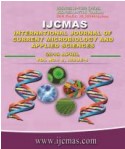


 National Academy of Agricultural Sciences (NAAS)
National Academy of Agricultural Sciences (NAAS)

|
PRINT ISSN : 2319-7692
Online ISSN : 2319-7706 Issues : 12 per year Publisher : Excellent Publishers Email : editorijcmas@gmail.com / submit@ijcmas.com Editor-in-chief: Dr.M.Prakash Index Copernicus ICV 2018: 95.39 NAAS RATING 2020: 5.38 |
A field experiment was conducted at Tamil Nadu Agricultural University, Coimbatore during kharif 2015 to investigate the influence of intercropping systems and weed management practices on weed density, dry weight and weed control efficiency in maize under irrigated condition. The experiment was laid out in split plot design and replicated thrice. Three intercropping systems viz., maize alone (I1), maize + blackgram (1:1 ratio) (I2) and maize + blackgram (2:2 ratio) (I3) were evaluated under main plot and four weed management practices viz., unweeded check (Control) 9 (W1), Pendimethalin 0.75 kg ha-1 as pre emergence (PE) 3 DAS + one hand weeding at 25 DAS (W2), Imazethapyr 75 g ha-1 as post emergence (POE) 25 DAS (W3) and Pendimethalin 0.75 kg ha-1 as PE 3 DAS + Imazethapyr 75 g ha-1 as POE 25 DAS (W4) were accommodated under subplot. Observations on weed parameters viz., weed density, weed dry weight and weed control efficiency were recorded. The results of the experiment revealed that among the intercropping systems, maize + blackgram (1:1) intercropping and among weed management practices, pendimethalin 0.75 kg ha-1 as PE 3 DAS + one HW 25 DAS recorded lesser total weed density and weed dry weight. Maize + blackgram intercropping along with pendimethalin 0.75 kg ha-1 as PE 3 DAS + one HW 25 DAS recorded higher weed control efficiency. The sole crop of maize recorded higher yield than maize under intercropping systems followed maize + blackgram intercropping at 1:1 ratio.
 |
 |
 |
 |
 |